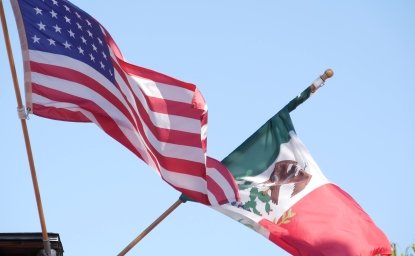Three-quarters of youth in 15 Arab countries think “our best days are ahead of us,” according to a new survey by Asada’a and Burson Marsteller. About 70 percent of respondents think the Arab world is “better off” since the uprisings began in December 2010, and 67 percent feel personally better off. Nearly half of youth say their government has become more transparent and representative.
But the level of optimism varies according to country. Three-quarters or more of respondents in the Gulf think their countries are “heading in the right direction,” according to the survey. But only 49 percent of youth outside of the Gulf share that opinion. For example, just 37 percent of Lebanese youth think their country is heading in the right direction. Tunisians and Libyans are slightly more optimistic.
More than 40 percent of Arab youth say civil unrest and lack of democracy are the two greatest obstacles to progress in the region. About a quarter of respondents are also concerned with a lack of Arab unity, the Palestinian-Israeli conflict and lack of political direction.
As the Arab uprisings fade from memory, news consumption is declining, according to the survey. In 2013, 46 percent say they update themselves daily on current affairs, down from 52 percent in 2012. About 28 percent of youth now turn to social media for news, while newspaper and magazine readership continues to plummet. Only a quarter of respondents say they read daily newspapers, down from 65 percent in 2010.
Arab youth are also increasingly turning to modern social values. In 2013, about 40 percent of respondents agree with the statement: “Traditional values are outdated and belong in the past; I am keen to embrace modern values and beliefs.” Only 17 percent agreed with that statement in 2011. The following are excerpts from the survey, followed by a link to the full text.
Majority of Arab youth are optimistic of the future and believe that “our best days are ahead of us.”
...Indeed, in each of the 15 countries surveyed, the clear majority of regional young people expressed confidence in the future. Notably, a nearly equal percentage of youth in Gulf and non-Gulf states (76% and 72%, respectively) agree that “our best days are ahead of us.”
Considering the last 12 months, 58% in the 15 countries surveyed believe their country is “heading in the right direction”, a marginal increase from 2012, when 55% agreed with this positive statement. Optimism is highest in the UAE (88%), Oman (80%) and Saudi Arabia (77%), while nearly half (49%) of those surveyed in countries outside the Gulf also believe their country of residence is heading in the direction, a slight increase compared with the year before. Libyan youth, however, are markedly less con‑dent in the direction of their country, with only 43% agreeing that their country is heading in the right direction, compared to 70% in 2012. Just 37% of Lebanese youth feel that their country is heading in the right direction. Young Tunisians are likewise pessimistic about the future, with only 42% agreeing that their country is heading in the right direction…
Regional youth are very proud of their Arab identity – especially in the wake of the Arab Spring – and increasingly embrace modern values and beliefs.
Nearly nine out of 10 young Arabs (87%) agree with the statement: “Following the events of the Arab Spring, I am more proud to be an Arab”. Out of that number 59% agree “a lot” and 28% “somewhat agree” with the statement…
Today, four out of 10 young Arabs agree with the statement: “Traditional values are outdated and belong in the past; I am keen to embrace modern values and beliefs”. at trend towards the adoption of modern values is pronounced over the past three years, with just 17% embracing modern values in 2011, rising to 35% in 2012 and 40% this year.
Civil unrest and lack of democracy are perceived as the region’s great twin obstacles.
When asked what they believe to be the greatest obstacles facing the Middle East, Arab youth agree that “civil unrest” (44%) and “lack of democracy” (43%) – two closely interrelated issues – will de‑ne the region’s ability to thrive in future. While youth in all 15 countries surveyed cited both of these issues among the top two obstacles facing the region, youth in Yemen more frequently cited “civil unrest” (49%) than “lack of democracy” (39%). Meanwhile, Egyptian youth remain those most concerned about the “lack of democracy” (49%), closely followed by their peers in Bahrain (48%)…
The UAE remains perceived as a model nation by youth across the region.
Asked to name the country, anywhere in the world, where they would most like to live, Arab youth continue, as in 2012, to cite the UAE as their preference, identified as the top choice among 31% of all those surveyed, followed by France (18%), the United States and Turkey (16%) and Saudi Arabia (14%).
Among those who would prefer to live in the UAE, that desire is most pronounced among young Saudis (36%) and Egyptians (35%). Likewise, when asked which country in the world they would most like their country to be like, the UAE again retains its top ranking, with 30% of all youth surveyed citing this Gulf state – again followed by France (17%) and the United States and Turkey (16%), with China (13%) this time taking the ‑fth position.
When asked which country’s model of growth and development would you most like your country to follow, the UAE has again retained its ‑rst-choice ranking, with 20% citing that country…
Among nations outside MENA, France most favourably by Arab youth.
The favourability of Arab youth towards France is the highest among countries outside the region for the second straight year, followed by Germany and China. Among those surveyed in the 15 countries, 44% describe themselves as “very favourable” towards France, a drop of 2% since 2012….
As the Arab Spring fades from memory, news consumption has declined; newspaper and magazine readership, in particular is plummeting.
While still high by global standards, the percentage of Arab youth who say they update themselves on news and current aairs on a daily basis – which spiked from just 18% in 2011 to 52% in 2012 – declined to 46% in 2013. Television remains the primary source of news for 72% of regional youth (up from 62% in 2012), followed by online news sources (59% compared to 51% in 2012) and newspapers (24% down from 32% in 2012)…
The impact of social media continues to increase rapidly.
Twenty-eight per cent of all Arab youth say that they turn to social media as a source of news, up from 20% in 2012 – and three percentage points higher than the percentage (24%) of those who say they get their news from daily newspapers. Meanwhile, when asked what they consider to be “the most trusted source of news”, television continues to the most-trusted media, cited by 40% of respondents, down from 49% in 2012 and 60% in 2011.
At the same time, the perceived trustworthiness of websites has reached a new peak of 26%, up from 18% last year. Over the same period, the percentage of youth who say they consider social media to be “the most trusted source of news” reached 22%, a massive 144% increase from 2012…
Click here for the full text.




